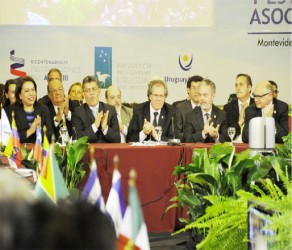Guyana yesterday signed a framework agreement to join the Southern Customs Union (MERCOSUR) as an associate member.
A release from Takuba Lodge said that Carolyn Rodrigues-Birkett, Minister of Foreign Affairs together with the Foreign Ministers of Argentina, Brazil, Uruguay and Venezuela, signed the Framework Agreement allowing Guyana to join MERCOSUR as an Associate Member.
The signing arose from a decision taken by the Council of Ministers at the MERCOSUR Summit held in Brasilia in December 2012, to bolster the relationship between MERCOSUR and Guyana and represents further integration between this country and itscontinental neighbours. The Framework Association Agreement covers political, economic, trade, productive development, cultural and other issues, the release said.

Rodrigues-Birkett thanked her colleague Foreign Ministers for welcoming Guyana into the MERCOSUR family. “Separated by history and culture in the past, Guyana has made a conscious decision to pursue its continental destiny and signing this Agreement today marks another step in this direction”, she was reported as saying.
She lauded the work done by the outgoing Chairman of MERCOSUR, Foreign Minister of Uruguay Luis Almagro, and the staff of the MERCOSUR Secretariat for completing the process in such a short space of time. The release said that Guyana applied for Associate Member status six months ago. Suriname is also expected to sign a similar accord.
MERCOSUR was established in 1991 by the Treaty of Asunción. It comprises Argentina, Brazil, Paraguay, Uruguay and Venezuela as full members.
Among its aims are the free transit of produced goods, services and factors among the member states. This includes the elimination of customs rights and removal of non-tariff restrictions on the transit of goods or any other measures with similar effects;
It also aims at the coordination of macroeconomic and sectorial policies of member states relating to foreign trade, agriculture, industry, taxes, customs and transport and communications.




